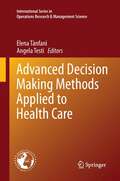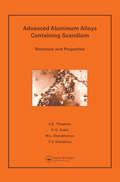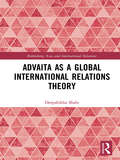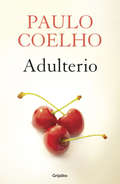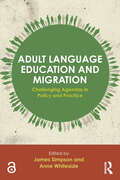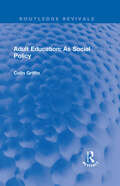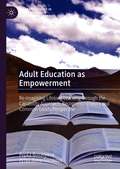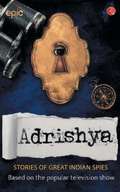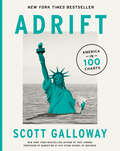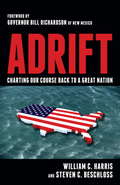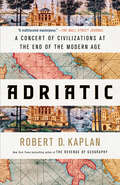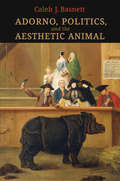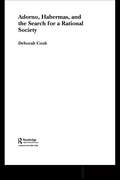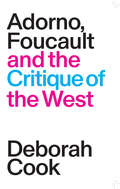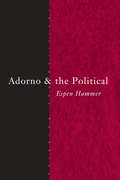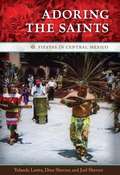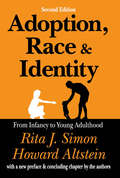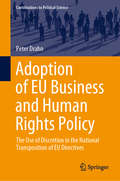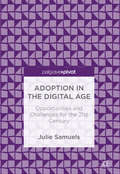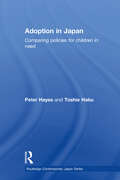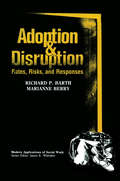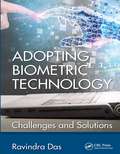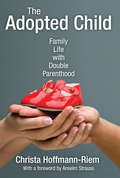- Table View
- List View
Advanced Decision Making Methods Applied to Health Care (International Series in Operations Research & Management Science #173)
by Angela Testi Elena TanfaniThe most difficult part of making decisions in the health care field on all levels (national, regional, institutional, patient) is linked to the very complexity of the system itself, to the intrinsic uncertainty involved and its dynamic nature. This requires not only the ability to analyze and interpret a large amount of information but also arrange it so that it becomes a cognitive base for appropriate decision-making. Moreover, decisions in the health care field are subjected to many challenges and constraints: fast change and uncertain outcomes, aging population, increasing citizen expectations, equity considerations and limited resources. Operations research, statistical and economic-related quantitative methods supply these decisions making tools and methodology. The contributed book presents a collection of applications to concrete situations detailing the problem area, the methodology employed, the implementation and results. Each topic addressed in the book will be structured in such a way that an interdisciplinary and wide audience will be able to use the materials presented. As an example the book chapters will address health policies issues, planning health services, epidemiology and disease modelling, home-care modelling, logistics in health care, capacity planning, quality and appropriateness.
Advanced Aluminum Alloys Containing Scandium: Structure and Properties
by L S Toropova Dmitry G. Eskin M L Kharakterova T V DobatkinaThis is the first book to generalize and analyze the extensive experimental and theoretical results on the phase composition, structure, and properties of aluminum alloys containing scandium. The effects of scandium on these properties are studied from a physico- chemical viewpoint. The authors present binary, ternary, and more complex phase diagrams for these alloys and consider in detail recrystallization, superplastic behavior, and decomposition of supersaturated solid solutions and the effects of solidification conditions on phase equilibria.
The Advance of the State in Contemporary China
by Sarah EatonSince the global financial crisis of 2008–9, central-level, state-owned enterprises (SOEs) in China have extended their reach into the Chinese economy. Some have interpreted this development as a turning point in Chinese economic development; a decision for state capitalism and a stand against slow but steady marketization. In The Advance of the State in Contemporary China, Sarah Eaton suggests that the shift is a much slower-moving process and that this particular aspect of state sector reform can be seen to predate the financial crisis. She argues that the 'advance of the State' has in fact developed incrementally from an eclectic set of ideas regarding the political and economic significance of large and profitable state-controlled enterprise groups. Drawing from case studies of China's telecommunication services and airline reforms, this fascinating new study offers illuminating insight into China's much-vaunted, but poorly understood, brand of state capitalism.
Advaita as a Global International Relations Theory: Beyond The Colony (Rethinking Asia and International Relations)
by Deepshikha ShahiThe academic discipline of International Relations strives to attain a ‘global’ spirit to narrow the cognitive gaps between the West and the Rest. On the one hand, there is the hegemonic presence of mainstream universalist Eurocentric IR theories, and on the other the counter-hegemonic presence of particularist Post-colonial and De-colonial non-Eurocentric IR theories. Nevertheless, both theoretical traditions endorse ‘epistemological dualism’ that essentially separates the ‘theorizing-subject’ from the ‘theorized-object’; thereby failing to bridge the gaps. This book uses the monist schema of ‘subject-object merger’ in the ancient Indian philosophy of Advaita to inaugurate a Global IR theory. In the global theoretical schema of Advaitic monism, the apparent particularist reality is supplemented (not contradicted) with the hidden universalist reality – the net result of which is a reconciliation of dualism with monism at the theoretical-practical level. The possibilities of this reconciliation have not been estimated at either level and as such, this untapped intellectual strategy stands to enrich both Eurocentric IR and non-Eurocentric IR. Shahi establishes Advaita as an alternative epistemological-methodological tool to re-imagine the complex realities of contemporary international politics. This fully fledged Global International Relations Theory will appeal to students of international relations, political theory, administrative theory and philosophy.
Adulterio
by Paulo CoelhoLa nueva novela de Paulo Coelho, con su magistral estilo, explora el universo emocional de la mujer, sus dudas, pasiones y secretos, su soledad, su entrega a lo prohibido y su redención.Porque, a pesar de todo, es mejor no vivir que no amar. Una mujer. Un secreto. Una pasión inesperada que trastoca su vida y sus valores.A sus 31 años, Linda tiene todo aquello que muchos sueñan y pocos logran conseguir: una vida perfecta. Un marido que la ama, unos hijos adorables, una exitosa carrera como periodista y una hermosa casa en Ginebra, Suiza. Y de pronto, sin previo aviso, su vida se pinta de sombras y comienza a temer que nada se transforme, o que todo cambie de improviso.Es en este momento cuando reencuentra a Jacob, su antiguo amor de la escuela, que irrumpe en su vida para sacarla de su letargo y hacerla sentir de nuevo esa pasión que creía olvidada. Atenazada entre la culpa y el placer, ella tendrá que encontrar su propia redención.
Adult Language Education and Migration: Challenging agendas in policy and practice
by James Simpson Anne WhitesideAdult Language Education and Migration: Challenging Agendas in Policy and Practice provides a lively and critical examination of policy and practice in language education for adult migrants around the world, showing how opportunities for learning the language of a new country both shape and are shaped by policy moves. Language policies for migrants are often controversial and hotly contested, but at the same time innovative teaching practices are emerging in response to the language learning needs of today’s mobile populations. This book: analyses and challenges language education policies relating to adult migrants in nine countries; provides a comparative study with separate chapters on policy and practice in each country; focuses on Australia, Canada, Spain (Catalonia), Finland, France, Ireland, the Netherlands, the UK and the US. Adult Language Education and Migration is essential reading for practitioners, students and researchers working in the area of language education in migration contexts.
Adult Education: As Social Policy (Routledge Revivals)
by Colin GriffinFirst published in 1987, Adult Education: As Social Policy intends to provide an introduction to the social policy analysis of adult education, contributing to the larger literature around lifelong or continuing education. The roots of policy in alternative social welfare models are traced to their ideological sources and to the origins of adult education theory itself. The development of professionalism is also considered in relation to policy analysis and there is a case study of major policy documents to illustrate the analysis. The book will be of interest to students of pedagogy, education, and policy.
Adult Education as Empowerment: Re-imagining Lifelong Learning through the Capability Approach, Recognition Theory and Common Goods Perspective (Palgrave Studies in Adult Education and Lifelong Learning)
by Pepka Boyadjieva Petya Ilieva-TrichkovaThis book re-imagines the essence and role of adult education at both the individual and societal levels. It provides arguments for understanding adult education as a process of agency and empowerment, which has not only instrumental but intrinsic and transformative roles to play. This book brings together ideas from the capability approach with insights from recognition theory; the embeddedness approach; the political economic perspective for understanding public and private goods and the common goods perspective. The analysis draws on data from large-scale international studies – alongside qualitative data - and adopts a wide-ranging European comparative perspective. The book develops original instruments for measuring different dimensions of adult education as a common good, and its realisation in different social contexts. It is aimed at academics, students, practitioners, and policy makers interested in adult and/or higher education and the social justice perspective to human life.
ADRISHYA_Stories of Great Indian Spies based on the popular television show_Transcreated: Stories Of Great Indian Spies: Based On The Popular Television Show
by Chandni MathurNot all wars are won on the battlefield and not all soldiers fight in combat. Some remain invisible, away from direct combat and yet risk their lives to protect the honour of their king and country. These are the faceless heroes of war—the spies—who collect classified information about the enemy, skilfully helping the ruler and the government of the land to safeguard their own territory. Packed with action, Adrishya is a collection of India's greatest spy stories. It captures the lives of spies—extraordinary men and women—through the danger, the fear and the triumphs. It narrates their heroic acts and follows them as they travel through dangerous landscapes, slip into disguises and hoodwink enemy soldiers. Starting off with India's first spy from the Mahabharata to the RAW officials of the 1971 war, this book is a collection of real spy stories which will entertain and inspire at the same time.
Adrift: America in 100 Charts
by Scott GallowayFrom bestselling author, CNN+ host of No Mercy, No Malice, and NYU business school professor Scott Galloway comes an urgent examination of the future of our nation – and how we got here. <p><p>We are only just beginning to reckon with our post-pandemic future. As political extremism intensifies, the great resignation affects businesses everywhere, and supply chain issues crush bottom lines, we’re faced with daunting questions: Is our democracy under threat? How will Big Tech change our lives? What does job security look like for me? America is on the brink of massive change—change that will disrupt the workings of our economy and drastically impact the financial backbone of our nation: the middle class. <p><p>In Adrift, Galloway looks to the past —from 1945 to present day—to explain just how America arrived at this precipice. Telling the story of our nation through 100 charts, Galloway demonstrates how crises such as Jim Crow, World War II, and the Stock Market Crash of 2008, as well as the escalating power of technology, an entrenched white patriarchy, and the socio-economic effects of the pandemic, created today’s perfect storm. Adrift attempts to make sense of it all, and offers Galloway’s unique take on where we’re headed and who we’ll become, touching on topics as wide-ranging as online dating to minimum wage to the American dream. Just as in 1945 and 1980, America is once again a nation at a crossroads. This time, what will it take for our nation to keep up with the fast and violent changes to our new world? <p> <b>New York Times Bestseller</b>
Adrift: Charting Our Course Back to a Great Nation
by William C. HarrisWhat has gone wrong for America and what can we do about it? Americans have begun to wonder whether our best days are ahead of us or are now past. Yet at a time of clear urgency and grave need, the nation's politicians seem increasingly unable to get beyond ideological battles and provide genuine leadership. Is this any way to run a great country? A precarious economy, the risk of global environmental catastrophe, a worldwide struggle over fossil fuel supplies, continuing threats from terrorists--these are just some of the nation's current challenges, as great as any that earlier generations have struggled against. But instead of working together to face and fix our problems in the historic tradition of America's can-do spirit, the nation finds itself adrift--dragged down by declining educational levels, a shift to entertainment and consumption over making things, a failure of political leadership, a troubling tolerance of destructive partisanship, an unquestioning assumption of pre-eminence, and a lack of creativity in forming partnerships to spur innovation and global advantage. This timely book not only diagnoses the critical systemic weaknesses plaguing America, but also lays out a workable blueprint for tackling the critical challenges we face today. With the intent of spurring a constructive national dialogue, the authors examine how:-We Americans can be jolted out of our complacency and motivated to bold action and common purpose. -Government can work in concert with industry to foster innovation and pursue critical goals.-We can elevate the quality of our educational system to meet new challenges.-We must encourage the best and the brightest immigrants from around the world to participate in the nation's future. -Individual cities and states are showing the way forward based on local initiatives.This book is more than a compelling narrative and a candid look at our current malaise. It is an inspiring call to action on how we as a nation can once again attain our full potential and thrive.
Adriatic: A Concert of Civilizations at the End of the Modern Age
by Robert D. Kaplan&“[An] elegantly layered exploration of Europe&’s past and future . . . a multifaceted masterpiece.&”—The Wall Street Journal&“A lovely, personal journey around the Adriatic, in which Robert Kaplan revisits places and peoples he first encountered decades ago.&”—Peter Frankopan, author of The Silk RoadsIn this insightful travelogue, Robert D. Kaplan, geopolitical expert and bestselling author of Balkan Ghosts and The Revenge of Geography, turns his perceptive eye to a region that for centuries has been a meeting point of cultures, trade, and ideas. He undertakes a journey around the Adriatic Sea, through Italy, Slovenia, Croatia, Montenegro, Albania, and Greece, to reveal that far more is happening in the region than most news stories let on. Often overlooked, the Adriatic is in fact at the center of the most significant challenges of our time, including the rise of populist politics, the refugee crisis, and battles over the control of energy resources. And it is once again becoming a global trading hub that will determine Europe&’s relationship with the rest of the world as China and Russia compete for dominance in its ports. Kaplan explores how the region has changed over his three decades of observing it as a journalist. He finds that to understand both the historical and contemporary Adriatic is to gain a window on the future of Europe as a whole, and he unearths a stark truth: The era of populism is an epiphenomenon—a symptom of the age of nationalism coming to an end. Instead, the continent is returning to alignments of the early modern era as distinctions between East and West meet and break down within the Adriatic countries and ultimately throughout Europe. With a brilliant cross-pollination of history, literature, art, architecture, and current events, in Adriatic, Kaplan demonstrates that this unique region that exists at the intersection of civilizations holds revelatory truths for the future of global affairs.
Adorno, Politics, and the Aesthetic Animal
by Caleb J. BasnettBuilt upon the principle that divides and elevates humans above other animals, humanism is the cornerstone of a worldview that sanctifies inequality and threatens all animal life. Adorno, Politics, and the Aesthetic Animal analyses this state of affairs and suggests an alternative – a way for humanity to make itself into a new kind of animal. Theodor W. Adorno has been accused of leading critical theory into a blind alley, divorced from practical social and political concerns. In Adorno, Politics, and the Aesthetic Animal, Caleb J. Basnett argues that by placing the problem of the human/animal distinction at the centre of Adorno’s thought, we discover a new Adorno, one whose critique of domination is in dialogue with classic concerns of political thought forged by Aristotle, including questions of humanist political education and the role of art. Through a close reading of primary sources, Basnett identifies the principal conceptual structure entwined with the understanding of human life as antagonistic to other animals, and outlines how forms of aesthetic experience disrupt this problematic concept in favour of a reconceptualization of what we call human. His analysis displaces the centrality of the human and attempts to open up a space for its transformation, both in terms of how humans relate to each other and in how humans relate to other animals.
Adorno, Habermas and the Search for a Rational Society (Routledge Studies in Social and Political Thought #Vol. 40)
by Deborah CookTheodor W. Adorno and Jnrgen Habermas both champion the goal of a rational society. However, they differ significantly about what this society should look like and how best to achieve it. Exploring the premises shared by both critical theorists, along with their profound disagreements about social conditions today, this book defends Adorno against Habermas' influential criticisms of his account of Western society and prospects for achieving reasonable conditions of human life. The book begins with an overview of these critical theories of Western society. Both Adorno and Habermas follow Georg Lukacs when they argue that domination consists in the reifying extension of a calculating, rationalizing form of thought to all areas of human life. Their views about reification are discussed in the second chapter. In chapter three the author explores their conflicting accounts of the historical emergence and development of the type of rationality now prevalent in the West. Since Adorno and Habermas claim to have a critical purchase on reified social life, the critical leverage of their theories is assessed in chapter four. The final chapter deals with their opposing views about what a rational society would look like, as well as their claims about the prospects for establishing such a society. Adorno, Habermas and the Search for a Rational Society will be essential reading for students and researchers of critical theory, political theory and the work of Adorno and Habermas.
Adorno, Foucault and the Critique of the West
by Deborah CookThe alliance of critical theory between Frankfurt and ParisAdorno, Foucault and the Critique of the West argues that critical theory continues to offer valuable resources for critique and contestation during this turbulent period. To assess these resources, it examines the work of two of the twentieth century's more prominent social theorists: Theodor W. Adorno and Michel Foucault. Although Adorno was situated squarely in the Marxist tradition that Foucault would occasionally challenge, Deborah Cook demonstrates that their critiques of our current predicament are complementary in important respects. Among other things, these critiques converge in their focus on the historical conditions-economic in Adorno and political in Foucault-that gave rise to the racist and authoritarian tendencies that continue to blight the West. Cook also shows that, when Adorno and Foucault plumb the economic and political forces that have shaped our identities, they offer remarkably similar answers to the perennial question: What is to be done?
Adorno and the Political (Thinking the Political)
by Espen HammerInterest in Theodor W. Adorno continues to grow in the English-speaking world as the significance of his contribution to philosophy, social and cultural theory, as well as aesthetics is increasingly recognized. Espen Hammer’s lucid book is the first to properly analyze the political implications of his work, paying careful attention to Adorno’s work on key thinkers such as Kant, Hegel and Benjamin. Examining Adorno’s political experiences and assessing his engagement with Marxist as well as liberal theory, Hammer looks at the development of Adorno’s thought as he confronts Fascism and modern mass culture. He then analyzes the political dimension of his philosophical and aesthetic theorizing. By addressing Jürgen Habermas’s influential criticisms, he defends Adorno as a theorist of autonomy, responsibility and democratic plurality. He also discusses Adorno’s relevance to feminist and ecological thinking. As opposed to those who see Adorno as someone who relinquished the political, Hammer’s account shows his reflections to be, on the most fundamental level, politically motivated and deeply engaged. This invigorating exploration of a major political thinker is a useful introduction to his thought as a whole, and will be of interest to scholars and students in the fields of philosophy, sociology, politics and aesthetics.
Adoring the Saints
by Yolanda Lastra Dina Sherzer Joel SherzerMexico is famous for spectacular fiestas that embody its heart and soul. An expression of the cult of the saint, patron saint fiestas are the centerpiece of Mexican popular religion and of great importance to the lives and cultures of people and communities. These fiestas have their own language, objects, belief systems, and practices. They link Mexico's past and present, its indigenous and European populations, and its local and global relations. This work provides a comprehensive study of two intimately linked patron saint fiestas in the state of Guanajuato, near San Miguel de Allende - the fiesta of the village of Cruz del Palmar and that of the town of San Luis de la Paz. These two fiestas are related to one another in very special ways involving both religious practices and their respective pre-Hispanic origins. A mixture of secular and sacred, patron saint fiestas are multi-day affairs that include many events, ritual specialists, and performers, with the participation of the entire community. Fiestas take place in order to honor the saints, and they are the occasion for religious ceremonies, processions, musical performances, dances, and dance dramas. They feature spectacular costumes, enormous puppets, masked and cross-dressed individuals, dazzling fireworks, rodeos, food stands, competitions, and public dances. By encompassing all of these events and performances, this work displays the essence of Mexico, a lens through which this country's complex history, religion, ethnic mix, traditions, and magic can be viewed.
Adoption, Race, and Identity: From Infancy to Young Adulthood
by Rita SimonAdoption, Race, and Identity is a long-range study of the impact of interracial adoption on those adopted and their families. Initiated in 1972, it was continued in 1979, 1984, and 1991. Cumulatively, these four phases trace the subjects from early childhood into young adulthood. This is the only extended study of this controversial subject.Simon and Altstein provide a broad perspective of the impact of transracial adoption and include profiles of the families involved in the study. They explore and compare the experiences of both the parents and the children. They identify families whose adoption experiences were problematic and those whose experiences were positive. Finally, the study looks at the insights the experience of transracial adoption brought to the adoptive parents and what advice they would pass on to future parents adopting children from different racial backgrounds. They include the reflections of those adopted included in the 1972 first phase, who are now adults themselves.This second edition includes a new concluding chapter that updates the fourth and last phase of the study. The authors were able to locate 88 of the 96 families who participated in the 1984 study. Bringing together all four phases of this twenty-year study into one volume gives the reader a richer and deeper understanding of what the experience of transracial adoption has meant for the parents, the adoptees, and children born into the families studied. This landmark work, will be of compelling interest to social workers, policy makers, and professionals and families involved on all sides of interracial adoption.
Adoption of EU Business and Human Rights Policy: The Use of Discretion in the National Transposition of EU Directives (Contributions to Political Science)
by Peter DrahnThis book explores how and why the transposition of EU directives in the new and contentious policy area ‘Business and Human Rights’ differs between member states. It reveals the extent to which individual member states are pursuing diverging approaches in dealing with the ‘discretionary space’ in EU directives, and highlights theoretical and political explanations. Drawing on historical institutionalism and rational choice institutionalism, the book establishes a link between the degree of corporatism in a given political economy and government behaviour in terms of Business and Human Rights policy. Moreover, it identifies political salience within the policy subsystem as a pertinent factor for explaining national transposition outcomes.
Adoption in the Digital Age: Opportunities and Challenges for the 21st Century
by Julie SamuelsAdoption in the Digital Age explores the transformation of adoption due to social and digital media technologies. The most prolific of these changes can be seen within contact arrangements, particularly those that are not managed by an intermediary, between adopted minors and their biological kin. Within this shift, it becomes clear that this often-breached contact arrangement lends itself towards discussions about further openness within adoption. At the same time these technologies continue to document the way adopted individuals and their biological kin feel about themselves and each other. It is for these reasons that the Internet remains both a promise and threat. Samuels explores this in detail, highlighting that what it means to be adopted continues to evolve in the context of networked media cultures. <P><P> Combining both theoretical discussions with the human experience of adoption, Adoption in the Digital Age will be of interest to students and scholars across a range of disciplines, including sociology, social work and cultural studies, as well as practitioners working with adoptive families and other members of the adoption triad connected and disconnected by adoption.
Adoption in Japan: Comparing Policies for Children in Need (Routledge Contemporary Japan Series #Vol. 9)
by Peter Hayes Toshie HabuThe first book-length study of adoption in Japan, this impressive work tackles the innovative and sometimes controversial subject of the policies of adoption agencies in Japan. The book places special adoption in the context of a liberal reformist agenda that has challenged traditional concepts of the family through the efforts to place children with difficult family backgrounds, including mixed and minority ethnic backgrounds. Drawing on empirical source material gathered since the late 1980s, the authors consider the central policy issue of whether agencies should be given a free hand to create their own policies, or whether they should be more tightly regulated. Finally, the book analyzes how different agency strategies for finding homes for hard to place children are related to different assumptions about the psychology and reasoning of prospective parents. Adoption in Japan makes a significant contribution to the academic literature in the fields of Japanese studies, public policy, social work and sociology. It will also be of interest to professionals involved in adoption agencies, specialist social work and adoption panels.
Adoption and Disruption: Rates, Risks, and Responses (Modern Applications Of Social Work Ser.)
by Richard P. BarthFirst Published in 2017. Routledge is an imprint of Taylor & Francis, an Informa company.
Adopting Biometric Technology: Challenges and Solutions
by Ravindra DasMany types of security technologies are currently in use, with biometrics being one of the latest and most cutting-edge forms that has been produced for mass application. Biometrics, while intriguing, is often broached with hesitation and poor understanding. Adopting Biometric Technology: Challenges and Solutions advocates increased implementation of biometric technology areas of the world where it has been least accepted, particularly in the United States. This book looks at several specific applications of biometric technology, challenging issues that have obstructed the use of biometrics in security and offering realistic solutions for increasing its worldwide utilization. It is divided into three sections, with the first discussing societal barriers against the adoption of biometric technology in security. The second section presents case studies of specific applications, such as e-passports and e-voting, that have already been implemented and could be expanded into regions where usage is low. The third section lays out a case for the general practicality and value that biometrics offers to relevant business sectors, including the benefits of implementing the currently controversial technology in place of the conventional forms of verification. While biometric technology has been poorly accepted and adopted in the United States as well as other developed nations, it is already a popular tool in developing nations in Asia, Africa, and Eastern Europe. Adopting Biometric Technology examines the societal resistance hindering the broader usage of biometrics and provides practical solutions for overcoming those barriers while showing how its increased application would be overall advantageous.
The Adopted Child: Family Life with Double Parenthood (Marriage And Family Studies Ser.)
by Christa Hoffmann-RiemThis exploration of the experiences of adopting parents and children offers unusual insight into adoption's complexity and its profound impact on family life. Based on the author's research in Germany, where she lived and taught, The Adopted Child has a great deal to say about child rearing and identity, as well as offering insights into similarities and differences in family life and adoption in Germany and the United States.Hoffmann-Reim takes the reader through the decision to adopt, the adoption placement procedure, and the transition from "applicant" to "mother and father." She explores differences between emotions experienced in adopting a baby, a toddler, and an older child, and how these emotions can affect relations with the world outside the nuclear family. A central concern is secrecy and disclosure with regard to the adopted child's origins.Based on case studies and extensive interviews, The Adopted Child has fascinated American readers as it did those in Germany. Professionals as well as those interested in adoption and family life in general will find it significant. Sociologists will find it solidly grounded in concepts and traditions from a diversity of related disciplines. And anyone interested in Germans and German society will find the materials revealing, and the author's interpretation insightful and wise.
Adolfo Suárez: Ambición y destino
by Gregorio MoránLa obra definitiva sobre Adolfo Suárez, el primer presidente de la democracia, con todas sus luces y todas sus sombras. Nombrado por sorpresa presidente de un gobierno autoritario en julio de 1976 y dimitido también por sorpresa como presidente de una democracia en enero de 1981, la trayectoria personal y política de Adolfo Suárez quizá simbolice mejor que ninguna otra lo que fue la España de las postrimerías del franquismo y la transición. Odiado hasta lo patológico por muchos durante su apogeo, y con el tiempo ensalzado por la mayoría, Suárez es sin duda una pieza clave en la construcción de la democracia. En esta extraordinaria biografía, Gregorio Morán, autor de un primer y polémico libro sobre Suárez en 1979, revisita al personaje no solo para contarnos el resto de su trayectoria, hasta la ya famosa foto con el Rey el 18 de julio de 2008, sino también reevaluar, a la luz de la España de hoy, un periodo fundamental de nuestra historia reciente. Reseña:«El perfil más cercano y verídico de un hombre que ya es historia viva de este país.»Cambio 16
